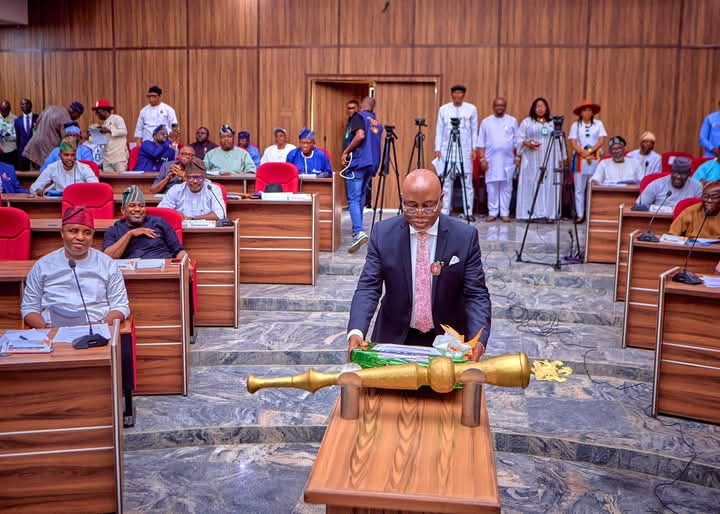Governor of Ondo State,Lucky Aiyedatiwa, has presented a budget estimate of ₦655.23 billion for the 2025 fiscal year to the State House of Assembly.
In a statement posted on his Footbook page today, Ebenezer Adeniyan, the governor’s Chief Press Secretary, said the budget tagged “Budget of Recovery,” aims to address key socio-economic challenges and foster development across critical sectors.
During the plenary session presided over by the Speaker, Olamide Oladiji, Governor Aiyedatiwa outlined the breakdown of the budget.
The allocation comprises ₦248.923 billion (37.99 per cent) for recurrent expenditure and ₦406.307 billion (62.01 per cent) for capital expenditure.

[PHOTO CREDIT: Facebook]
He said the proposed budget prioritises infrastructural development, with ₦238.572 billion (36.40 per cent) earmarked for projects aimed at revamping the state’s physical and economic structures.
The governor added that education follows with ₦77.024 billion (11.80 per cent), agriculture with ₦56.102 billion (8.60 per cent), and health with ₦46.016 billion (7.00 per cent).
Other allocations according to him include, public finance: ₦125.456 billion (19 per cent), environment and sewage management, ₦13.084 billion (2.00 per cent)—administration of justice, ₦13.163 billion (2.8 per cent), trade and industry, ₦8.839 billion (1.30 per cent) and general administration with ₦34.398 billion (5.20 per cent).
Governor Aiyedatiwa expressed gratitude to the people of the state for their support and peaceful conduct during the recent elections, highlighting the legacy of his predecessor, the late Oluwarotimi Akeredolu,
“We have delivered on our promises and seek to consolidate our gains through the 2025 Budget. This proposal focuses on recovery and growth, addressing socio-economic challenges, and ensuring prosperity for our people,” the governor said.
He praised the Assembly for its role in addressing the state’s fiscal challenges, especially through the passage of the 2024 Revised Appropriation Bill.
Aiyedatiwa highlighted his administration’s successes in agriculture, infrastructure, and human capital development.


